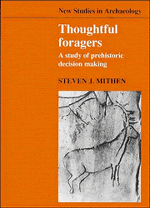Book contents
- Frontmatter
- Contents
- List of figures
- List of tables
- Preface
- 1 Introduction
- PART ONE LEARNING FROM THE PRESENT
- 2 The eco-psychology of decision making
- 3 The ethnography of hunter-gatherer decision making
- PART TWO MESOLITHIC FORAGING AND SOCIETY
- PART THREE UPPER PALAEOLITHIC ART AND ECONOMY
- Bibliography
- Index
3 - The ethnography of hunter-gatherer decision making
Published online by Cambridge University Press: 04 August 2010
- Frontmatter
- Contents
- List of figures
- List of tables
- Preface
- 1 Introduction
- PART ONE LEARNING FROM THE PRESENT
- 2 The eco-psychology of decision making
- 3 The ethnography of hunter-gatherer decision making
- PART TWO MESOLITHIC FORAGING AND SOCIETY
- PART THREE UPPER PALAEOLITHIC ART AND ECONOMY
- Bibliography
- Index
Summary
Esau was a cunning hunter…
Genesis 25:27Archaeologists studying the Palaeolithic and Mesolithic may use the ethnographic record of historically documented hunter-gatherers in a variety of ways. Some seek cross-cultural generalisations for theory building or hypothesis testing. Others focus on the relationships between behaviour and its material consequences for middle-range research. Alternatively archaeologists may use it simply as a source of analogies for supporting inferences drawn about past behaviour. When we have written and photographic records of hunter-gatherers ‘in action’ it would indeed be perverse to ignore them. But it would be equally foolish to forget that we are seeing modern and not ‘Stone Age’ society.
It is readily apparent that historically documented hunter-gatherers provide poor analogies for the ‘pristine’ hunter-gatherers represented by the archaeological record alone. Often these are dependent upon state societies; they make extensive use of modern technology; hunting and gathering may be pastimes rather than providing essential sustenance and are often pursued only in response to the goading of anthropologists. Some, perhaps many, ‘modern’ foragers have switched from an agricultural lifestyle. As a result the foraging problems they face, the goals they choose, the information sources exploited, the way such information is processed, and the consequences which may occur, probably bear little if any relationship to those of prehistoric hunter-gatherers.
This is all true but of little consequence for my ends. One of my principal arguments is that the decision-making processes of any group or individual possess unique characteristics whether our subjects are alive today or forgotten in prehistory.
- Type
- Chapter
- Information
- Thoughtful ForagersA Study of Prehistoric Decision Making, pp. 52 - 88Publisher: Cambridge University PressPrint publication year: 1990

